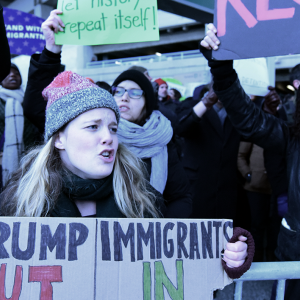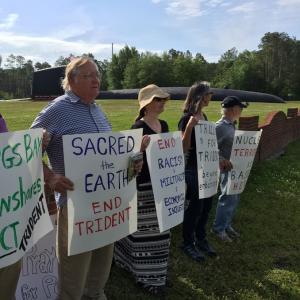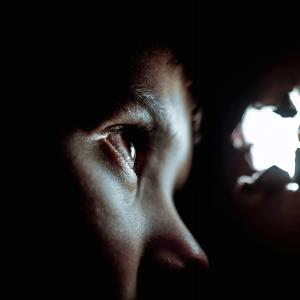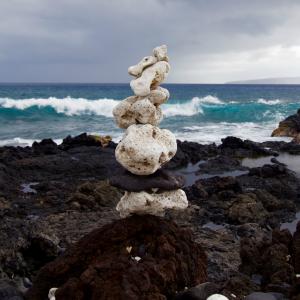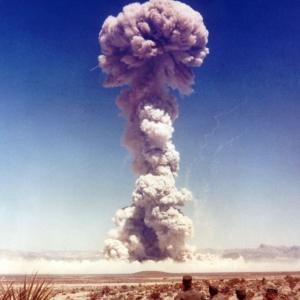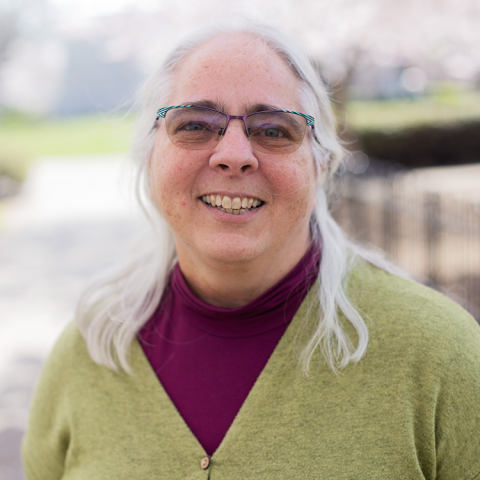
Rose Marie Berger is a Catholic peace activist and poet. She has been on Sojourners staff since 1986, and worked for social justice movements for 40 years. Rose has rooted herself with Sojourners magazine and ministry. She has written hundreds of articles for Sojourners and other publications and is a sought after preacher and public speaker. After living in Washington, D.C., for 35 years, she moved to Oak View, Calif., in 2022.
Rose’s work in Christian nonviolence has taken her to conflict zones around the world. She is active in the Catholic Nonviolence Initiative, a project of Pax Christi International, and served as co-editor for Advancing Nonviolence and Just Peace in the Church and the World, the fruit of a multiyear, global, participatory process to deepen Catholic understanding of and commitment to Gospel nonviolence. Her poetry has appeared in the books Watershed Discipleship: Reinhabiting a Bioregional Faith and Practice and Buffalo Shout, Salmon Cry: Conversations on Creation, Land Justice, and Life Together. She is author of Bending the Arch: Poems (2019), Drawn By God: A History of the Society of Catholic Medical Missionaries from 1967 to 1991 (with Janet Gottschalk, 2012), and Who Killed Donte Manning? The Story of an American Neighborhood. She has also been a religion reviewer for Publishers Weekly and a Huffington Post commentator. Her work has appeared in National Catholic Reporter, Publishers Weekly, Religion News Service, Radical Grace-Oneing, The Merton Seasonal, U.S. Catholic, and elsewhere. She serves on the board of The International Thomas Merton Society.
With Sojourners, Rose has worked as an organizer on peace and environmental issues, internship program director, liturgist, community pastor, poetry editor, and, currently, as a senior editor of Sojourners magazine, where she writes a regular column on spirituality and justice. She is responsible for the Living the Word biblical reflections on the Revised Common Lectionary, poetry, Bible studies, and interviews – and oversees the production of study guides and the online Bible study Preaching the Word.
Rose has a veteran history in social justice activism, including: leading the first international, inter-religious peace witness into Kyiv, Ukraine, following the outbreak of war in 2022, organizing inter-religious witness against the Keystone XL pipeline; educating and training groups in nonviolence; leading retreats in spirituality and justice; writing on topics as diverse as the “Spiritual Vision of Van Gogh, O'Keeffe, and Warhol,” the war in the Balkans, interviews with Black activists Vincent Harding and Yvonne Delk, the Love Canal's Lois Gibbs, and Mexican archbishop Ruiz, cultural commentary on the Catholic church and the peace movement, reviews of movies, books, and music.
Rose Berger has taught writing and poetry workshops for children and adults. She’s completed her MFA in poetry through the University of Southern Maine’s Stonecoast program. Her poetry has been published in Sojourners, The Other Side, Radix and D.C. Poets Against the War.
Rose grew up in the Central Valley of California, located in the rich flood plains of the Sacramento and American rivers. Raised in radical Catholic communities heavily influenced by Franciscans and the Catholic Worker movement, she served for nine years on the pastoral team for Sojourners Community Church; five as its co-pastor. She directed Sojourners internship program from 1990-1999. She is currently a senior editor and poetry editor for Sojourners magazine. She has traveled throughout the United States, and also in Ukraine, Israel/Palestine, Costa Rica, the Netherlands, Northern Ireland, Bosnia, Kosova, Peru, Colombia, Venezuela, and El Salvador visiting primarily with faith communities working for peace in situations of conflict.
Rose was born when atmospheric CO2 was at 319.08 ppm and now lives with her wife Heidi Thompson in Oak View, Calif., in the Ventura River watershed on traditional Chumash lands. Learn more at rosemarieberger.com.
Rose’s articles include:
- Pursuing the Secret of Joy: What is joy when it's not promiscuously tied to happiness, Hallmark, or hedonism?
- Why Our Faith Delegation went to Ukraine?: Our public message was simple: “We have come to Kyiv in solidarity to pray for a just peace.”
- Nonviolence in Najaf?: Will we recognize an Islamic peace movement when we see it?
- Of Love's Risen Body: The poetry of Denise Levertov, 1923-1997
- Glimpses of God Outside the Temple: The spiritual vision of Vincent Van Gogh, Georgia O'Keefe, and Andy Warhol.
- Damnation Will Not Be Televised: Almost everything I know about hell I learned from watching Buffy the Vampire Slayer
Speaking Topics
- Christian nonviolence, peace, war
- Catholic Nonviolence Initiative
- Climate change, creation care, watershed discipleship
- Bible study, liturgical year
- Poetry
- Spirituality and social justice
- Any topic covered in Sojourners magazine
- Catholicism
Speaking Format
- Preference for virtual events, but willing to discuss in-person events on case-by-case basis
Posts By This Author
In Suicide, Who Sinned?
Love is a universal obligation.
SUICIDE IS A SIN. As a Catholic, that’s what I was taught. Life is a gift from God; only God can take it away. Suicide chooses despair over God.
But I’ve never understood suicide to be an individual sin. It’s a communal one—based in a profound failure of love.
This past spring, two young men committed suicide while in the custody of the Department of Homeland Security. Beyond individual and communal sin is structural sin—when lovelessness is made into policy and enacted with cruelty. Note all the places where love failed.
In May, Marco Antonio Muñoz, a 39-year-old Honduran refugee, died in a south Texas jail cell of apparent suicide a few days after being forcibly separated from his wife and 3-year-old son at the U.S. border. And I mean “forcibly.”
When Border Patrol agents told Muñoz that the family would be separated, he “lost it,” according to The Washington Post. “‘The guy lost his s—,’ an agent said. ‘They had to use physical force to take the child out of his hands.’”
Muñoz was transferred to a county jail and placed in a padded isolation cell. Guards checked on him every 30 minutes. Reportedly, every time the guards passed during the night, they noted him praying in the corner of his cell. By morning, Marco Antonio Muñoz was dead.
3 Things U.S. Catholic Bishops Can Do About Family Separation and Incarceration at the Border
In this violent crisis, not significantly mitigated by President Trump’s recent executive order,every Catholic bishop becomes a “border bishop.” The tools of active nonviolence offer a way forward. In the first World Day of Peace message, Blessed Pope Paul VI said, “Peace is the only true direction of human progress — and not the tensions caused by ambitious nationalisms, nor conquests by violence, nor repressions which serve as mainstay for a false civil order.” He warned of “the danger of believing that international controversies cannot be resolved by the ways of reason, that is, by negotiations founded on law, justice, and equity, but only by means of deterrent and murderous forces.”
Charlottesville, the Summer After
Remembering requires storytellers.
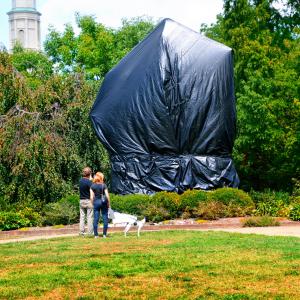
Kim Kelley-Wagner Shrouded statue of Robert E. Lee in a Charlottesville park.
THERE IS NOTHING new under the sun, as the author of Ecclesiastes reminds us. In this, theologian Elsa Tamez said, we can “find solidarity in our discontent.”
I visited Charlottesville in May, nearly a year after the “summer of hate.” I heard from young Christians who had been on the frontlines at Robert E. Lee Park (now called Emancipation Park). I stood in the presence of their discontent, listening and witnessing to the ongoing, traumatizing effects of last summer’s “fascist lollapalooza,” as one University of Virginia professor put it.
Still reckoning with the memory of Aug. 12, one leader in his 20s shared how he had tried to be a nonviolent defender amid multiple “armed actors,” including the Ku Klux Klan, neo-Nazis, anti-fascists, and police. By the end of that day, two state troopers were dead, one woman was murdered, dozens were injured, and the whole community was emotionally, spiritually wounded.
The Mosquito Manifesto
Are we American Christians or Christians in America?
WHAT DO YOU do when the democratic process delivers the power of the presidency to an authoritarian leader with the strategic impulse control of a 2-year-old?
Here are a few responses I’ve observed.
OPTION 1: The Ostrich. Bury one’s head in the sand until the annoyances pass. The virulent rhetoric of Mr. Trump’s campaign, combined with his appointees and advisers, make this option available only to men of European decent. (White women may cover their heads, but shouldn’t bury them completely.)
OPTION 2: The Spaniel. Fluff up one’s coat and appear clean and eager on the doorstep of the new master. Hope for the best; hope for a bone. This option is supported by many who are well-meaning, are part of the political elite, or are dangerously naive.
OPTION 3: The Cockroach. When the light comes on, scatter into the street with a sign saying “Not My President.” Or simply hide in a dark corner hoping to pass the coming wrath undetected. This escape behavior is instinctual in creatures that are startled or undeveloped.
Since the wee hours of Nov. 9, I’ve exhibited most of these behaviors myself.
But as a Christian, I’m not allowed to live in illusions for long. In Paul’s “letter of tears,” written to the fledgling church at Corinth, he wrote, “We cannot do anything against the truth, but only for the truth” (2 Corinthians 13:8). Therefore, existing in a “post-truth” state is not an option.
Americans are deeply disillusioned about the state of our nation. The fundamental optimism of the “American dream” has not matched reality for at least three generations. American optimism has always been partly delusion, as evidenced by the experiences of those defined outside of it or on whose backs the “great good” was built.
An election, however, is supposed to be a tool for the nonviolent transfer and distribution of power, not a therapy session to deal with disillusionment.
When You See Something ... Act!
Active-bystander intervention is what 'love your neighbor' looks like in public.
ROBERT HARVEY had a problem. The church he pastors was vandalized after the election: “Trump Nation. Whites only” was scrawled across its sign. His congregants, nearly 85 percent of whom are immigrants from West Africa, Latin America, and the Caribbean, were shaken.
The Southern Poverty Law Center reported 1,094 bias-related incidents across the country in the month after the election. The greatest number of these types of events are against women in public spaces who are also immigrants, Muslim, or African American. These are assumed to be a “small fraction of hate-related incidents,” as the Bureau of Justice Statistics estimates that two-thirds of hate crimes go unreported.
Harvey, rector of Episcopal Church of Our Saviour in Silver Spring, Md., decided to take action. First, he reached out to the local community and other religious congregations. Second, he signed up for a nonviolence and “active bystander intervention” training.
To understand how to be an “active bystander,” one must first understand the “passive bystander” effect. Research shows that when someone needs help and they are in a crowd, bystanders are less likely to act. The more bystanders there are to an event, the more each one thinks someone else will help.
The Beatitudes and Executive Order 13767
False hope is found in a thousand Facebook posts.
OUTSIDE, A HELICOPTER circles this D.C. neighborhood, a dog barks anxiously in the alley. Inside, a woman sits in a straight-backed chair reading the Beatitudes. She adjusts her glasses. “Bienaventurados los que lloran, porque ellos recibirán consolación.” Blessed are those who mourn, for they will be comforted. “It’s a beautiful prayer,” she says.
My neighbor Lola cleans office buildings during the week, takes English classes on Saturdays, goes to Mass on Sundays. Her husband operates a jackhammer for a construction crew. On the “Day Without Immigrants,” Lola’s boss said because it wasn’t organized by the union, workers should not stay home. So she went to work. Her husband stayed home. “We have to stand together,” he said.
Lola and her husband sometimes share their one-bedroom apartment with a man who was their neighbor in El Salvador. He works days, nights, weekends. He sleeps on a mattress in their main room for a few hours in the afternoon. Lola leaves pupusas for him, wrapped and warm. Sometimes he drinks too much, turns up the radio, dances. They quiet him so he doesn’t disturb the neighbors. He feels safe there.
Piracy and Puritanism at Wells Fargo
Advent is a time to push back against “the data of despair,” a time to take actions that generate “narratives of hope.”

Northfoto / Shutterstock.com
I OPENED MY first savings account at Wells Fargo in Sacramento, Calif., when I was 8 years old. I remember the bronze stagecoach penny bank they gave me to help me practice saving. When I moved to Washington, D.C., I put my money into a D.C.-based bank, soon bought out by Wells Fargo. But it wasn’t the same Wells Fargo I’d grown up with.
In 2012, the Justice Department found Wells Fargo guilty of discriminating against both African-American and Latino borrowers during the subprime mortgage heist. It’s one of the top two banks invested in the Corrections Corporation of America, which is one of the largest for-profit prison companies in the U.S. In 2015, Wells Fargo was the world’s largest bank.
This fall, Wells Fargo CEO John Stumpf, who abruptly resigned in October, was called before a congressional investigative committee to answer accusations that thousands of Wells Fargo employees secretly opened 2 million fraudulent accounts without customers’ permission or knowledge, and were incentivized by the company to do so. Employees opened false banking and credit card accounts, transferred funds, and created phony access codes and email addresses. “The frauds violate federal and state statutes against bank fraud and identity theft,” William K. Black Jr., white-collar criminologist and cofounder of Bank Whistleblowers United, told Sojourners. Customers incurred charges and fines; in some cases, their credit ratings were damaged.
CEO Stumpf accepted “full responsibility for all unethical sales practices in our retail banking business.” (John Steinbeck once called this kind of thing a successful combination of “piracy and puritanism.”)
Wells Fargo claims that it has fired 5,300 people since 2011 related to these practices, but details are vague; the fraud investigators were hired by Wells Fargo. We don’t know how many were fired because they couldn’t fulfill the extortionate sales quotas.
An Abundance of Cultural Differences
Catholics from different parts of the world have widely divergent experiences and contrasting approaches to “just war.”
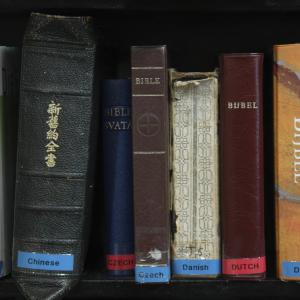
Awe Inspiring Images / Shutterstock.com
'WE CAN JOYFULLY anticipate an abundance of cultural differences and varied life experiences among the participants in the Rome Conference,” wrote Pope Francis in his welcome letter to the Nonviolence and Just Peace gathering in Rome, “and these will only enhance the exchanges and contribute to the renewal of the active witness of nonviolence as a ‘weapon’ to achieve peace.”
Nowhere were the “cultural differences” and “varied life experiences” more conspicuous than in the conversation about whether there is ever a Christian justification for armed force.
U.S. and Western European academics are thoroughly trained in the theory, theology, and application of just war theory. It’s taught in U.S. and European seminaries. It’s taught in all military academies. It provides a framework for international law.
In stark contrast, Catholics living in Iraq, Sudan, Uganda, Afghanistan, Syria, Congo, Sri Lanka, and other war-torn countries are not schooled in just war philosophy. It is not part of training for priests or academics or those in political life. When people from war-ravaged regions talk about “just war,” they speak from the experience of having been on the receiving end of “morally acceptable” drone strikes. They make a powerful argument for a paradigm shift away from just war thinking.
In regions of civil unrest, some said, where religious extremism is used as propaganda to advance partisan military and political objectives, even associating the language of “just war” with Catholicism can categorize Catholics as “combatants.”
In the case of Colombia’s brutal, 52-year-long civil war, Jesuit priest Francisco De Roux described how just war teaching misled Catholics into taking up arms. “In my Catholic country,” said De Roux, “our nuns and priests join the guerillas because of the just war paradigm. The Catholic paramilitaries pray to the Virgin before slaughtering people because of the just war paradigm.”
Total Eclipse (of the Soul)
Flyover America will go dark.
THIS WON'T HAPPEN again until 2045. On Aug. 21, the thumb of God (with a little help from the moon) will smudge out the sun. A total solar eclipse will mark the brow of the United States with a Stygian darkness so deep that stars will unmask in midday. From Lincoln City, Ore., to Charleston, S.C., “flyover” America will go dark.
In Hebrew tradition, the darkening of the sun or reddening of the moon are markers of cataclysmic political events with spiritual consequences. In Greek, eclipse means “abandonment,” in Hebrew “defect.” God’s light is in a state of hiddenness.
Game Changer?
What if 1.2 billion Catholics embraced gospel nonviolence?
“JUST WAR IS KILLING US! There is no just war.”
That proclamation by a Catholic sister from Iraq, and others like it, resounded at a Vatican gathering this spring and fell on surprisingly receptive ears.
Sister Nazik Matty, an Iraqi Dominican, joined others from around the world in Rome in April to wrestle with how the Catholic Church could “recommit to the centrality of gospel nonviolence.” She has watched members of her religious community die for lack of medical care during war.
“Which of the wars we have been in is a just war?” asked Sister Matty, who was driven from her home in Mosul by ISIS, also known by the Arabic acronym Daesh. “In my country, there was no just war. War is the mother of ignorance, isolation, and poverty. Please tell the world there is no such thing as a just war. I say this as a daughter of war.”
The Rome gathering on Nonviolence and Just Peace was unprecedented, bringing together members of the church hierarchy with social scientists, theologians, practitioners of nonviolence, diplomats, and unarmed civilian peacekeepers to discuss Catholic nonviolence and whether in the contemporary world armed force can ever be justified.
Of course, with such diverse participants, there was not a common mind on whether just war theory, a doctrine of military ethics used by Catholic theologians, has outlived its usefulness as church teaching.
Some of the academics and diplomats—particularly from the United States and Western Europe—maintained that just war criteria, when properly applied, are useful when working within halls of power, from the Pentagon to the United Nations, for restraining excessive use of military force by a state. One participant cautioned against “broad condemnations of just war tradition, if it means closing off dialogue with our allies.” Another questioned how diplomacy could continue without the just war framework as its common language.
But Catholics who came to Rome from conflict zones—Afghanistan, Iraq, Pakistan, Palestine, Colombia, Mexico, the Democratic Republic of Congo, Burundi, and Uganda—brought a different perspective.
Bosnian Butcher Radovan Karadžić Says Genocide Conviction Based on Jokes
"America, keep your peace. You don't know how precious it is and how terrible is war."
Bond Denied for 7 Catholic Protesters Who Prayed on Nuclear Submarine Base in Georgia
Just steps away from a decommissioned submarine buried in the ground near the main gate at the Kings Bay Naval Submarine Base in Georgia, anti-nuclear peace activists held a vigil Saturday morning to protest the U.S. nuclear arsenal and to show support for seven Catholic peace activists arrested early Thursday morning for unauthorized entry onto the base.
Life Inside a Tomb
Jesus rose in three days but some forms of resurrection seem to take longer.
IT IS HARD to tell time from inside a tomb. We cannot know how many minutes or hours Jesus’ resurrection took. Traditionally, he was in the tomb for three days. But how long does it really take for someone to rise—or be raised—from the dead?
Some resurrections start at a mundane moment. Dorothy Day, for example, was sitting at the kitchen table in a crowded apartment in New York’s East Village (writing a never-to-be published novel) when the French Catholic theologian Peter Maurin knocked on the door. “It was a long time before I really knew what Peter was talking about that first day,” wrote Day, who went on to found the Catholic Worker movement with Maurin. “But he did make three points I thought I understood: founding a newspaper for clarification of thought, starting houses of hospitality, and organizing farming communes. I did not really think then of the latter two as having anything to do with me, but I did know about newspapers.”
Some resurrections come through brutal suffering. Twenty-four-year-old Recy Taylor was left for dead in 1944 on a dark road near Abbeville, Ala., by the six white men who kidnapped and raped her as she walked home from a prayer meeting at Rock Hill Holiness Church. “A few days later, a telephone rang at the NAACP branch office in Montgomery,” wrote historian Danielle L. McGuire in At the Dark End of the Street. The president of the local branch promised to send his “best investigator” to speak with Recy Taylor. The investigator’s name was Rosa Parks. As part of Park’s organizing work on Taylor’s case, she formed what would become the Montgomery Improvement Association, the leaders responsible for instigating the bus boycott a decade later, an opening salvo of the civil rights movement.
An Outline for a Service Acknowledging War Crimes
A poem.
“Has the United States ever apologized?
Or are we too big to apologize?”
—Warrant Officer Hugh Thompson
The Chaplains Handbook has no confiteor or rite,
neither Book of Common Prayer nor missalette,
for scrutinies that beg forgiveness from the torn
and desecrated dead. We come contrite
for reports of helicopter gunships,
bodies observed in a ditch, the undress
of a girl who covered only her eyes:
Noncombatant gang rape, with bayonet.
The Way of the Gun
The gun involved in Donte Manning's death belonged to a cop.
THIRTEEN YEARS ago, on Holy Thursday, 9-year-old Donte Manning was shot around the corner from my house in Washington, D.C.
He died of his injuries four weeks later, on the Feast of Paschasius Radbertus, a ninth-century Benedictine theologian who wrote on intimacy between the body of Christ crucified and the real presence in the Eucharist. Donte’s death impacted me deeply. (I wrote a book about his murder.)
Caught in the crossfire between neighborhood rivals, Donte Manning was the real body sacrificed on the altar of this imperial city where teenage boys shoot each other over $200 Air Jordans and the Pentagon exports more than 1.45 million firearms to various security forces, just in Iraq and Afghanistan. (The Pentagon lost track of more than half of them.)
As theologian Ched Myers reminds, “Against the presence of Power is pitted the power of Presence: God with us.”
Donte Manning’s murder was never solved. It remains a cold case. Mitch Credle, the investigating detective, retired from the D.C. Metropolitan Police. In October, he decided it was time to talk about his one unsolved murder. He was interviewed by local news reporter Paul Wagner.
The Pope Makes a (Very) Long Distance Call
What does it mean to call "Love" the force that moves the universe?
Pope Francis reaches to the margins. He’s washed the feet of prisoners and homeless families. Like his Assisi namesake, he’s hugged contemporary “lepers” and made common cause with garbage collectors. But I was still surprised when the pope made a 20-minute video call to the International Space Station in orbit 200 miles above the Earth.
Pope Francis wasn’t the first pontiff to make that long-distance call—his predecessor did that in 2011. But tracking stars and gazing into the heavens have been part of Judeo-Christian tradition since God asked whether Job could “bind the cluster of the Pleiades or loose the belt of Orion” (38:31) some 3,500 years ago. Despite that unfortunate Galileo kerfuffle in the 1600s over the “heresy” of believing that the Earth revolved around the sun, the Vatican has operated state-of the art telescopes since 1582.
As an enthralled 5-year-old, I made a scrapbook about the Apollo 11 spaceflight that placed the first humans on the moon. As an 18-year-old, I marveled at the elegance of physics formulas that served equally well for measuring distances in cells and solar systems. At 54, I laughed out loud when I recognized Fibonacci’s sequence in the passionflower we planted in the back alley. “The universe as a whole, in all its manifold relationships, shows forth the inexhaustible riches of God,” wrote Pope Francis.
Nonviolent Fight Club: Why U.S. Catholics Are Still Debating Nonviolence
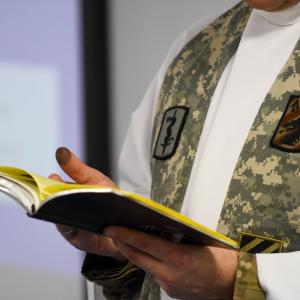
Image via 30th MED/Flickr
The work of the Catholic Nonviolence Initiative, born from the April 2016 Rome meeting, recognizes that most of the people with political power are not the victims of social violence. CNI is bringing the voice of grassroots Catholics in the majority of the world, who are the primary victims of social violence and war, into the ring.
Devil and the Deep Blue Sea
It's hard to hear with the devil tweeting in your ear.
The coastal fog lifts to the height of soft bluffs and a man appears on the beach. The tide is low. I watch him hold a specially crafted staff in his right hand that he uses to poke, prod, and drag lines in the sand. He totters along like a modern Rumi, hand scribing an elegant poem on the strand. Perhaps in sand script it says: “Small birds destroyed an army, so you’d know they gained their strength from God.”
For the past six years, Denny Dyke has kept his morning ritual, creating intimately carved, hundred-feet-wide sand labyrinths—sacred circles, holy walkways, salt-soaked mandalas—on the Oregon coast. He draws for an hour, outlining 4,000-year-old designs and adding his own, creating ephemeral art.
I met Denny near Bandon, Ore., at a time I was desperate for spiritual rest. It has been an exhausting year. A year since the demon of white supremacy recaptured the White House. A year of rapacious capitalist thugs masquerading as legislators, callous political buffoonery inciting legislative chaos, greasy fingers tweeting too near the nuclear button, acts of hate rising like sea levels.
Why Don’t We Have a 2-Check System on Our Nuclear Weapons?
"It always requires two people, two separate actions, to launch, steal, sabotage, or tinker with an atomic warhead," Peter Zimmerman, nuclear physicist and State Department consultant wrote for USA Today. "This is the inviolable two-person rule intended to prevent misuse of a nuclear weapon."
Developers Are Trying to Build a Pipeline Through a Watershed. These Nuns Built a Chapel in Its Path.
More than 500 people gathered in a hot and dusty Pennsylvania cornfield yesterday afternoon to join the Catholic sisters of the Adorers of the Blood of Christ for the dedication of a new outdoor chapel, built on land about to be seized from them by a corporate developer planning to build a natural gas pipeline.




